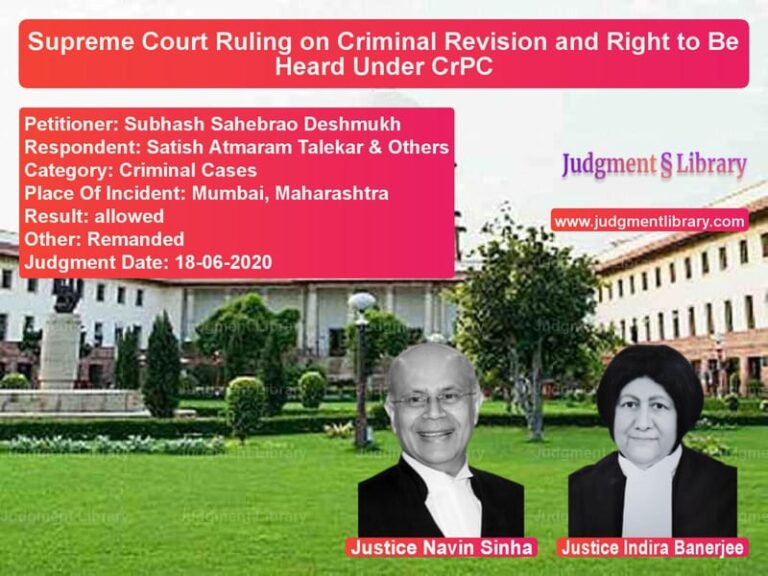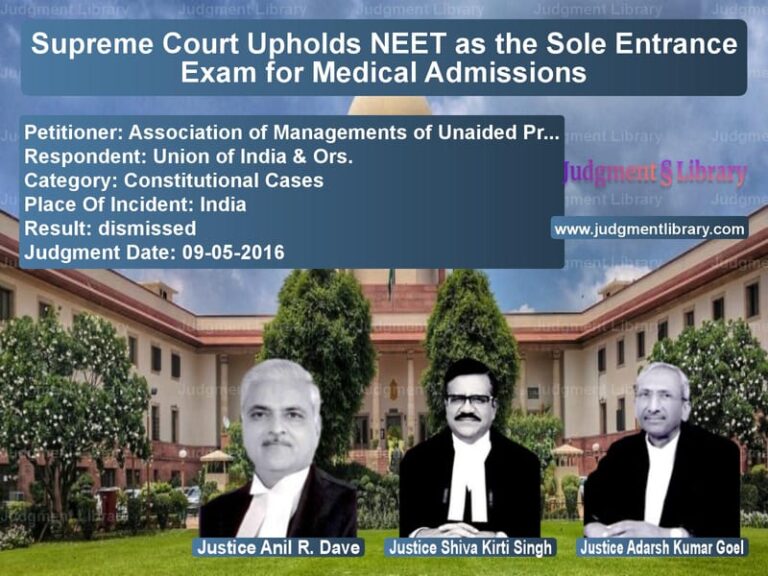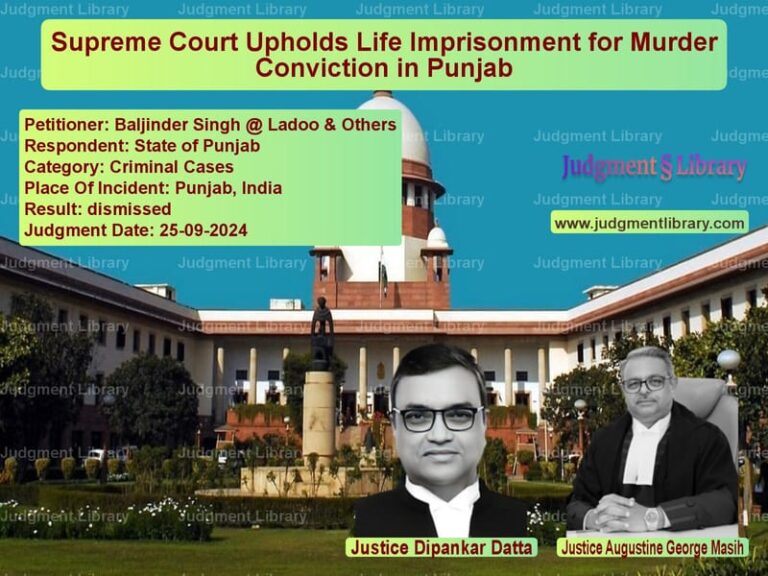Partial Acquittal in Dowry Harassment Case: Supreme Court Overturns Abetment to Suicide Conviction
The Supreme Court of India has partially allowed the appeal of Kamalakar, who was convicted under Sections 498A and 306 of the Indian Penal Code (IPC). The case revolves around allegations of cruelty towards the deceased wife, leading to her alleged suicide. While the court upheld his conviction under Section 498A IPC for cruelty, it overturned his conviction under Section 306 IPC for abetment to suicide, citing insufficient evidence linking his actions directly to her death.
Background of the Case
The case dates back to 1994, when the deceased, who was married to the appellant Kamalakar, died after allegedly setting herself on fire at her parental home. The prosecution alleged that she was subjected to harassment and mental cruelty by her husband and in-laws due to her inability to conceive and for not performing household and agricultural tasks to their satisfaction.
Initially, the case was registered under Section 498A IPC for cruelty. However, after the woman succumbed to her burn injuries, Section 306 IPC (abetment to suicide) was added. The trial court convicted Kamalakar on both counts, sentencing him to two years of rigorous imprisonment under Section 498A IPC and seven years under Section 306 IPC.
Arguments by the Prosecution
The prosecution presented the following claims:
- The deceased was subjected to cruelty by the accused and his family, particularly after two years of marriage.
- She was assaulted by Kamalakar during a trip to Bombay and was later sent back to her parents’ home.
- The accused expressed his intent to remarry, which further mentally distressed the deceased.
- The cumulative acts of cruelty led the deceased to take her own life.
Defense Arguments
Kamalakar, through his counsel, argued that:
- The deceased had been residing at her parental home for two months before her death, making it impossible for him to have abetted her suicide.
- There was no direct evidence proving that his actions directly led to her suicide.
- His parents were acquitted due to lack of evidence, and he was convicted based on the same evidence, which was unfair.
- The prosecution failed to establish any proximate cause between his alleged cruelty and her decision to end her life.
Supreme Court’s Analysis and Ruling
Conviction Under Section 498A IPC
The Supreme Court upheld Kamalakar’s conviction under Section 498A IPC, stating:
“There is a specific overt act attributable to the appellant wherein he assaulted and ill-treated the deceased on the ground that she was not doing household work properly. He also refused to take her back to their matrimonial house despite repeated requests made by the deceased’s parents.”
The court emphasized that cruelty and harassment within seven years of marriage create a presumption against the accused. Since Kamalakar failed to provide substantial rebuttal evidence, his conviction under Section 498A IPC was affirmed.
Acquittal Under Section 306 IPC
The Supreme Court, however, set aside Kamalakar’s conviction for abetment to suicide, holding that:
“There seems to be no proximate link between the marital discord and the deceased’s subsequent death by burning herself. The appellant has not committed any positive or direct act to instigate or aid in the commission of suicide.”
The court referred to precedents such as Ramesh Kumar v. State of Chhattisgarh, which stated that instigation requires a direct act of provocation or encouragement. The court further cited M. Mohan v. State, which clarified that abetment involves an intentional act that leads to suicide.
Since the deceased had been staying at her parental home for two months before the incident, the court concluded that the appellant could not have directly influenced her decision to commit suicide.
Final Judgment
- The Supreme Court acquitted Kamalakar under Section 306 IPC.
- His conviction under Section 498A IPC was upheld.
- The court modified his sentence for cruelty, reducing it to the period already served (seven months).
- His bail bonds were discharged, and no further imprisonment was required.
Conclusion
This ruling clarifies the legal requirements for convicting someone under Section 306 IPC. The court emphasized that mere cruelty or harassment does not automatically amount to abetment of suicide; there must be clear instigation or direct involvement. While Kamalakar was held accountable for subjecting his wife to cruelty, the court ensured that he was not wrongly punished for a more severe charge without sufficient evidence.
Petitioner Name: Kamalakar.Respondent Name: State of Karnataka.Judgment By: Justice Vikram Nath, Justice Rajesh Bindal.Place Of Incident: Chinkera Village, Karnataka.Judgment Date: 12-10-2023.
Don’t miss out on the full details! Download the complete judgment in PDF format below and gain valuable insights instantly!
Download Judgment: kamalakar-vs-state-of-karnataka-supreme-court-of-india-judgment-dated-12-10-2023.pdf
Directly Download Judgment: Directly download this Judgment
See all petitions in Domestic Violence
See all petitions in Dowry Cases
See all petitions in Suicide Cases
See all petitions in Legal Malpractice
See all petitions in Bail and Anticipatory Bail
See all petitions in Judgment by Vikram Nath
See all petitions in Judgment by Rajesh Bindal
See all petitions in partially allowed
See all petitions in Modified
See all petitions in supreme court of India judgments October 2023
See all petitions in 2023 judgments
See all posts in Criminal Cases Category
See all allowed petitions in Criminal Cases Category
See all Dismissed petitions in Criminal Cases Category
See all partially allowed petitions in Criminal Cases Category







